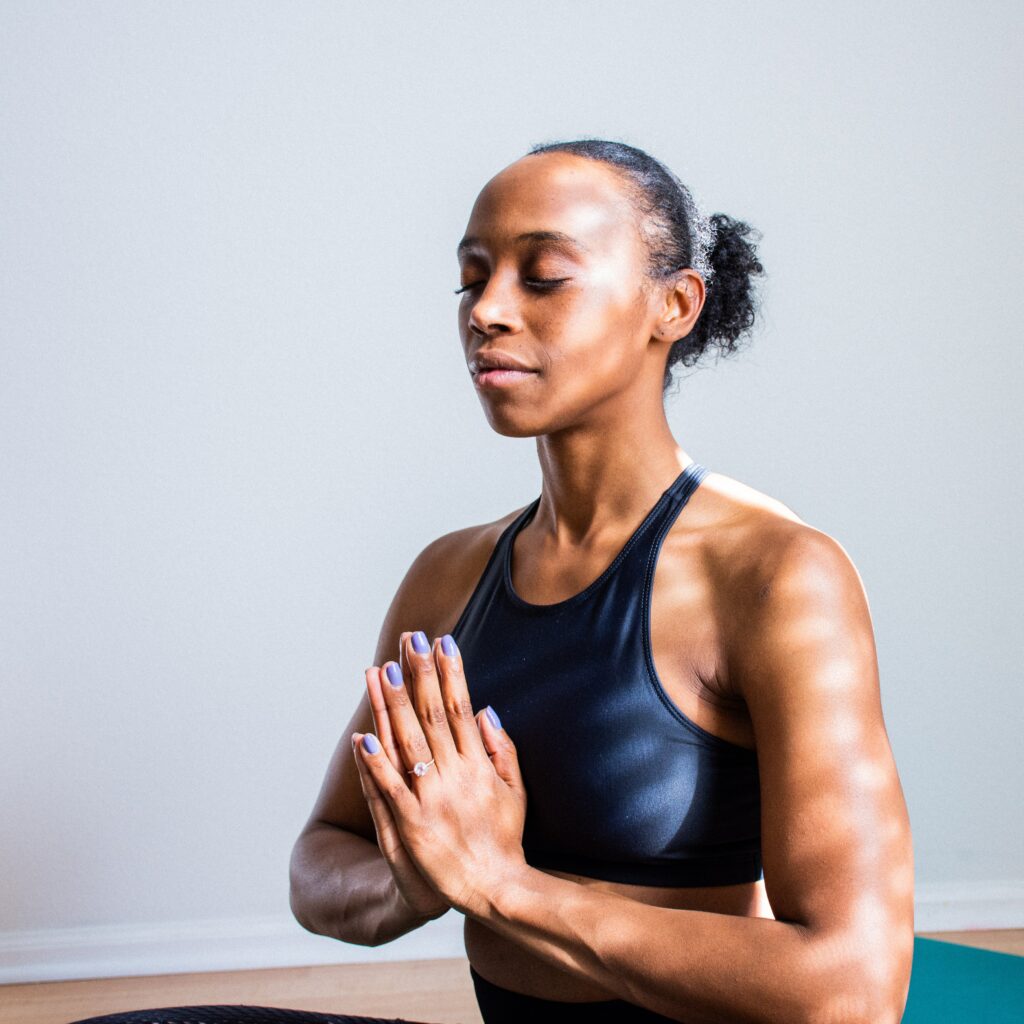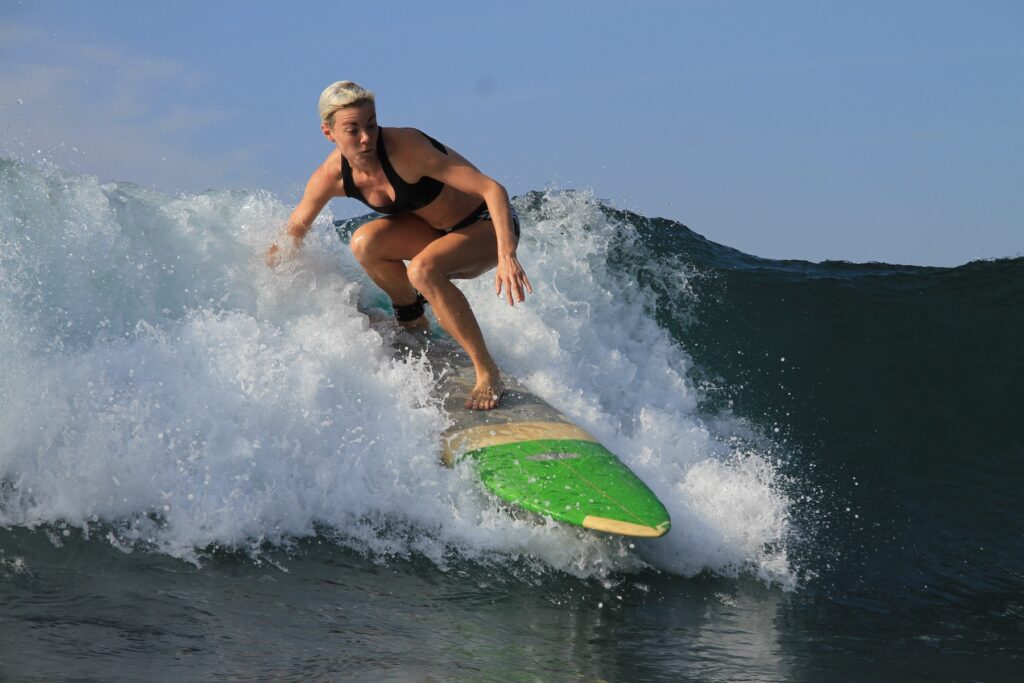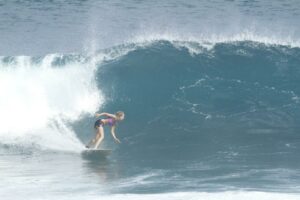How Surfing Can Improve Your Mental Health.
For me, there is no distinction between Spiritual and mental health. As a surfer and a hippy, surfing has saved my life when it comes to my mental well-being.
But from a psychologist’s point of view who I’m sure leaves out spiritual mentions, so as not to confuse patients or alienate people who don’t believe in any type of spirituality, they have a practicality to mental health. There are many cross-overs between what is considered good for us to have as mental health practices and what we are experiencing through surfing.
This article looks at some of those therapy aspects and their connection to surfing.
Perhaps like me when I first saw surfers in real life catching waves, I was mesmerized by the way they could dance along a wave. It was magical. And seeing them bob on the surface staring into the horizon gave me a sense of peace just watching them. That, coupled with the first time I watched the movie Point Break (the original of course) and saw the way the characters described surfing with such passion and reverence made me long for those feelings in my life. I was already somewhat in love with the ocean, so convincing myself to take the sport wasn’t hard.
Now 17 years later, of life completely revolved around the waves, I can break down the key factors of surfing that are related to common suggestions of things we should all be doing to keep our minds and body healthy and find joy in a crazy world.
So why is surfing therapy?
- Connecting to Nature
- Breathing
- Letting ourselves be a little out of control/ getting out of our comfort zone
- Focusing our attention / Being in the moment
- Conquering fears
- Improving your self-esteem
- Learning new skills
- Socializing/belonging to a tribe
Connection To Nature

It is no coincidence that some of the most enjoyed sports are the ones of extreme nature. Like hiking, cycling, skiing, rock climbing, canoeing, and surfing of course.
When we connect with the ocean which is what surfing is all about, finding the rhythm, mirroring the speed of the wave, gliding down the face, and calving our way along in a playful dance. It’s a feeling of oneness, with the biggest natural source on our planet.
It’s both humbling and at the same time reminds us that we are a part of it.
Just having our bodies in the water is a primal reminder of our origins in the womb. Also, the fact that we are made up of 60% water must play a significance. We are weightless in the salty sea which means it has a soothing effect on our bodies.
For me, staring at the horizon whilst waiting for waves is not only calming but also gives me a feeling of belonging and endless possibilities. When our minds are full of confusion and bouncing thoughts that give us anxiety, it is a grounding sensation to see something that is a constant like the horizon.
The sheer mass of water in the ocean puts our petty minds into its small place as we understand the world is bigger and more impressive than little us.
The sea air gives us fresh oxygen which fills our bodies. And the lapping of the waves has a rhythmic meditation to it.
All life came from the sea and so deep in our DNA, we have a sense of belonging to it.
My sunrise and sunset sessions in surfing are some of my favorites. In El Salvador being so close to the equator means I get to surf with the sun coming up directly on the horizon to the east and I get to watch it sink into the sea at the end of a beautiful day towards the west.
Without wanting to sound too hippy, witnessing the beauty of nature feeds my soul. And obviously, that makes me feel great!
Those are my thoughts on it. Here is a quote from psychcentral.com
“Minerals in the sea air reduce stress; negatively charged ions in the sea air combat free radicals, improving alertness and concentration; salt in the water preserves tryptamine, serotonin, and melatonin levels in the brain, which aid in diminishing depression or increasing your overall sense of wellness; and research has demonstrated that the sounds of waves alter the brain’s wave patterns, producing a state of relaxation.”
They go on to quote an article taken from environmental psychologist Mathew White who did a consensus showing that being near the sea significantly improves peoples well being.
Breathing

Apart from the obvious that breathing keeps us all alive, deep breathing into the depth of our lungs improves our circulation and feeds our muscles. When we ”consciously breath” as is a well-known form of meditation and relaxation, we are doing so by taking thoughts out of our minds and into the body.
Surfing is a tough form of exercise. Paddling with speed and purpose increases the need for oxygen. I see in my students time and again when they are paddling out to the wave lineup, getting out of the impact zone, and also paddling in for the waves, that their breathing rate increases rapidly. I constantly tell them to breathe deeply all the way into the belly, which in turn gives them focus on their breath and calms the mind.
I have in the past experienced a panic attack, though thankfully this hasn’t happened to me for many years now. But the anxiety made me breathe very rapidly to the point of almost hyperventilation. When we do strenuous sports activities, especially cardio like surfing, we need to regulate our breathing patterns to function efficiently. So through surfing, you are learning the ability to control your breath and then you are developing a skill for life that can calm you of anxiety.
Another aspect of breathing in surfing is breath-hold. When we fall off a wave and go under the water, or turtle roll or duck-dive we hold our breath. In small waves for beginners to intermediate, you will only need to hold your breath for a few seconds. When learning to surf sometimes a “hold down” can feel like many seconds and a need to reach the surface and breathe. This is purely a psychological fear factor, as the real-time you are actually under is perhaps 1–2 seconds, occasionally 3 to 4. And this amount of seconds is completely fine to be without breath for our body’s functionality. I do Wim Hof breathing techniques every morning when I wake up and hold my breath at the end of a breathing sequence round for 2 minutes without stress.
However, to a beginner surfer, that is a little panicked with the wave-tumbling aspect, those 2 seconds can seem long. But as we progress in surfing we are learning to relax underwater in this situation and again control our minds. So breath-hold becomes a type of meditation and therefore therapy.
You can see more here about why breathing exercises improve your mental health at diversushealth.org
Letting ourselves be a little out of control/ Getting out of our comfort zone

Surfing is a sport that we have to adapt ourselves to in nature. By timing ourselves to the ocean and letting the waves take us, as well as when we are being thrown about a little in the wash, we need to be able to relax and let the ocean do its thing. So to a certain degree, we release our control. This acceptance is a form of synchronizing ourselves with the elements and is great for our mental health.
By accepting the things we can’t completely control we reduce stress and anxiety.
The board is a new thing attached to us, the paddling technique and pop-up are all alien things to a new surfer. Then add the power of waves, and the sounds of the ocean, and a lot of newbies to surfing are quite out of their comfort zone.
To ”get out of our comfort zone” is what we must undertake when learning any challenging new skill. And surfing is lifelong when it comes to improving skills and techniques. Perhaps in the beginning with a new student, just being in the ocean or the waves is a daunting thing.
In fact, that adrenalin we get from being out of our comfort zone, can become quite addictive. Because when you challenge yourself with something you are not familiar with, by completing the task and getting the reward of riding a wave, you realize we are capable of more things than you thought possible.
And that makes us feel great!
Oliver Page MD talks about this as leaving our comfort zone to enter a growth zone
Focusing our attention / Being in the moment
Because in surfing we have so much going on with the waves, and where we need to position ourselves and catch the waves by building up our speed and chasing the right point where the wave is breaking, we need complete focus.
Taking off on the wave is also timing, moving our bodies in the right way, and always looking in the direction of where we want to go.
Therefore as with anything that is shifting and changing in the environment that we have to adapt to, to succeed and catch those waves we need to be very focused on what we are doing. Surfing is a dance with nature. We move in time to her rhythm so, therefore, we must be completely in the moment.
Many mindfulness experts talk of this being the best thing for our mental health and happiness. My favorite of these personally is Eckhart Tolle who wrote the famous book “The Power of Now”
So by doing activities like surfing that force us into the present moment, we are training ourselves to understand that presence reduces stress and anxiety. But more than that, by being present in whatever we are doing something that makes us feel alive! It also allows us to have the full experience of what we are doing. And when you’re flying along the wave, that experience is pure joy!
Here’s a piece from the mental health organization UK that talks of the importance of mindfulness https://www.mentalhealth.org.uk/explore-mental-health/publications/how-look-after-your-mental-health-using-mindfulness

Conquering Fears
For many new surfers seeing and feeling the power of the waves, can give them a sense of fear. As a surf instructor myself I don’t push anyone to go out into the water if they are completely afraid. But if they have a little bit of fear then this is something we can work with.
Nearly everyone when surfing experiences some level of fear at the point of Taking- off on the wave. The moment of jumping to your feet as you go down the face of the wave. In fact, that rush of adrenalin which disguises itself as fear, never really goes away. But much like with a roller coaster, or a tall slide as a kid, it’s the rush you get off the drop, that makes it so exciting.
I call it the leap of faith. A certain amount of abandonment is necessary to let gravity and the power of the wave push you down the face. It’s the most fun part actually.
However, in the beginning, I have many students that battle with this fear, and we work together to understand how we harness that fear to take the plunge. And indeed as you progress with your surfing and ride bigger and bigger waves, you develop an addiction to that rush, you still have the flight or flight moment of the takeoff, that you must overcome.
But with all things in life that give us fear, when we overcome those challenges of those moments, it is the most rewarding feeling of our achievements. In surfing, as we enjoy that thrill of the ride of the wave, we call it “stoke”
By practicing a sport that preempts that fear to then overcome it, we are training ourselves for life. So when we have fear on land for whatever reason, like going to lead a meeting at the office, passing our driving test, or going out on a first date, etc, The feeling and knowledge within our bodies and mind that we can overcome this because we have done it so many times in surfing before, allows us to face those fears head-on and overcome those challenges.

A quote from the great Nelson Mandela, “I learned that courage was not the absence of fear, but the triumph over it. The brave man is not he who does not feel afraid, but he who conquers that fear.”
Improving Your Self-Esteem
When I first started surfing 17 years ago, it was not a sport that many women took part in. So when I paddled out, unsure of what I was doing, I also had the added intimidation of going into this male pack of surfers. It was not a very welcoming atmosphere for me. But after I had caught that first wave of boogie boarding when I was 16, I knew I wanted to be a surfer. So I had made up my mind. I was going to stick at it.
So there I was in France, alone, trying to learn this complicated and exhausting sport, whilst feeling slightly intimidated being the only woman. And it seemed in this location, the only surf tourist!
But I was determined. I knew I wanted this magical feeling of flying along on a wave, so I went every day. And slowly day by day, the wolf pack began to see that I wasn’t giving up. And one by one they started to give me tips and advice and encouragement. And this made me gain confidence. Suddenly because of my willpower, I was accepted into the group.
This is what I probably love the most about teaching. By passing on my knowledge and seeing that glimmer of determination in a student’s eyes to then watch them succeed with a skill, like a pop-up, or a turtle roll or even paddling over a wave that they thought was big and scared them a little. But they did it! Then that look of satisfaction and pride in their eyes.
There are so many skills we have to learn in surfing. So every time they manage to learn that new skill they light up a little more. And they gain more and more confidence in their abilities.

No one is good at surfing when they first try, so it takes a lot of self-esteem to keep doing it. As when you guide someone, it’s still them that has to do the action themselves. But I constantly remind my students that everyone still falls off waves. The real heroes are the ones that get back on the board again and again. That’s being a surfer.
And what a beautiful metaphor for life. When you fall off the horse (wave) you get back on. And that builds your self-esteem.
And when you catch more and more waves consistently, you start to walk a little taller in life.
When you get to surf with a group of friends cheering your waves, you feel such joy and confidence. And that confidence carries with you into your day-to-day life. And that’s what attracts me to doing female surf retreats. This feminine empowerment that we give each other. That kind of support builds us up even quicker.
But make no mistake. Ultimately, it’s you and the wave, and what decisions you make to catch that wave. And having those moments with the elements is the best way to improve yourself as a human. To respect nature, the ocean itself, the way your body must move in accordance with it. All of this comes from self-assurance in what you are doing, or even what you are attempting to do.
More on the benefits of self-esteem to improve mental health at a very well mind
Learning new skills
Surfing is a lifelong learning experience. As a coach when I break everything down into bite-size pieces, I realize just how much there is to learn in this sport. And once you have learned one skill you go and practice it until it feels right for you. It’s a combination of skill and art form. No one surfer, surfs the same.
I can look out into the waves from a distance and know exactly which one of my friends is on the wave by his/her style.
In this technical age that we are living in, we are constantly having to learn new skills to adapt to the world, our environment, and our jobs. This can be very overwhelming at times.
Therefore developing the discipline to learn a new skill and not be intimidated by it, or overtaken by doubt in your abilities to do it is a challenge. I think we all face this in our day-to-day lives.
Surfing is therefore the steroid version of this learning curve of skills. It’s so intense when you’re learning a new skill like a bottom turn in surfing for example. Because of your body position, the timing of the wave, the position of the angle of your board, and understanding the speed and momentum at the same time. It’s so many factors that have to come into play to get it right. And then each wave is slightly different and we have to adapt again. It can be so frustrating and aggravating when it doesn’t go right, but our wonderful brains are cataloging each wave and recalculating from our successful and unsuccessful outcomes, of everyone we try, to then hone in our response time, and muscle feeling and energy exertion with the overall feeling, to make us successful.
It’s such a wonderful combination of events that leads us to that moment of getting it right! And what a sense of achievement you feel when you do it! This in turn gives us more confidence.
And when we have a hobby that we do that is constantly forcing us to learn new skills it keeps life interesting, engaging, and something new to look forward to. What will I learn next? It’s a question that keeps us evolving as a human being. It’s also good for brain stimulation of course.
Having a coach who can give an outside perspective and tell you what to work on, speeds up this process of skill learning dramatically, but you still have to do the skill repetitively to feel the perfect combination of events. And that feeling of perfect balance, grace, slicing the wave, touching a hand into the water as you pivot back up into the face of the wave is just a feeling of pure heaven!
So surfing is such a great way to train our minds to have this sense of bliss with learning a new skill and transferring those associations into regular life.
check out this article on the mind/body benefits of learning a new skill

Socializing and Belonging to a Tribe
Humans are social creatures, and unfortunately, with the way technology is going, it feels like we’re losing our natural abilities to bond with one another. I am grateful that I have had sport in most of my life. And I really enjoyed team sports growing up, as they seemed to bring out the best in me and allow me to bond and make friends for life.
When you are a surfer it is both a solitary experience and a group experience. You are all hunting for the same waves. But at the same time when you see your friend catch a great wave, you feel a rush of excitement for them and a pleasure in knowing what they will be feeling as they fly along it.
Becoming a surfer is not something you become overnight. So there is this unseen bond or tribe between us, the knowing tribe. The ones who have experienced this magical thing in life, and those who haven’t.
Sure, sometimes there can be a bad vibe from some people out there. Sometimes the ‘locals’ where ever you’re at, can be a bit intimidating. But, mostly it’s about sharing the stoke as we say. The stoke is that amazing feeling of gratification, wonder and a rush of adrenalin all mixed in together.
When you surf enough times with the same people, sometimes it could just be a week. But if you go every day together and share in each other’s experiences, the falls, the waves, the laughs. It’s a remarkable feeling. And it binds you to those people.
There’s nothing like sharing your stories of being smashed by the waves to get a familiar connection with each other. Over time, it’s tribal. We even have the secret handshake!
In this day and age, I am noticing with people in life becoming more superficial, that we have a deep need to be able to connect to one another on a more spiritual level. And surfing, because it humbles you, does exactly that. You can’t surf well without that spiritual connection. And when you see it in others it brings us together.
You can see here from Medical news today.com how socializing and community encourage happiness and longevity.

So in Conclusion.….
So here we looked at why surfing is therapy. From my personal point of view, it is my holistic version of therapy because of all the points I covered that transfer themselves into my regular life and well-being.
Many things in life contribute to making us feel good and function well in society. Life is challenging for everyone and we must find the things we love, the things that bring us joy, to keep us away from the dark thoughts that come to us all.
As a sufferer of anxiety and depression, I know the things I need to do to keep myself on the right track. Surfing has been the main constant in my adult life, to replenish myself in stressful times. I’ve created friends for life, and I never stop learning and challenging myself with this sport therefore it is something a crave to keep me happy and sane. It also helps that it’s usually centered in places of outstanding natural beauty.
It’s wonderful to find an outlet like this that can tick off all those mental health benefits. And this is why I call it therapy.
Of course, I’m not a medical physician, and if you are in a very bad way with mental illness, finding a professional therapist or doctor is a good idea. Also reaching out to friends and family.
If you are looking to improve any of the mental wellness ideas listed in my 1–8 things in this article, then I can definitely recommend having a go at surfing. If you’re just starting your surfing adventure remember it can be dangerous and challenging and an ISA surfing coach can give you a great introduction to the sport.
If you would like to join me on one of my retreats, please check out the rest of the website, and contact me. In the meantime, enjoy the ocean. Peace.


